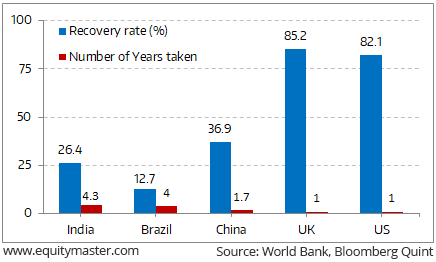Majority of the Asian indices are trading with moderate gains. Hong Kong's Hang Seng gained 74 points, China's Shanghai Composite added 3 points, while Japan's Nikkei 225 slipped 6 points. In the US, major averages closed with modest gains on Thursday, led by gains in the energy, financials and telecom sectors.
Back home, India share markets have opened the day on a positive note. The BSE Sensex is trading higher by 80 points while the NSE Nifty is trading higher by 17 points. The BSE Mid Cap index opened up by 0.4% while BSE Small Cap index opened the day up by 0.5%.
Barring consumer durables stocks, all sectoral indices have opened the day in green with realty stocks and capital goods stocks witnessing maximum buying interest. The rupee is trading at 64.09 to the US$.
Bank stocks opened the day on a mixed note with IDBI Bank and United Bank of India leading the gains. In the latest development, the Reserve Bank of India (RBI) said gross non-performing assets in the system shot up to 10.2% as of the September quarter, primarily led by private sector lenders. RBI has also warned that the situation will only aggravate from there, "elevating" the systemic risks.
However, in the half-yearly Financial Stability Report (FSR), the central bank said the financial system remains "stable" overall though it has pegged the bad loans spiking to 10.8% by the March quarter and to 11.1% by September 2018.
Overall, the stressed assets, including restructured loans and dud loans increased marginally to 12.2% during the same period from 12.1%. The state-run banks' GNPA shot by 100 bps to 13.5% while the same for their private sector peers jumped to 3.8%.
Incidently, private sector lenders, considered more prudent are the ones reporting the most stress reporting a whopping 40.8% spike in their GNPAs as against 17% by the state-run ones whose lazy banking has been blamed primarily for the mess in the system.
The overall gross non-performing assets or GNPAs in the system have grown to 10.2% as of the September quarter from 9.6% six months earlier, when the last FSR was released.
In what should cause more concern for everyone, a baseline scenario of the Reserve Bank says the GNPAs ratio will slip further to 10.8% in the March quarter and 11.1% by September 2018.
The overall investment climate remains challenging though the situation has shown improvement since 2017-18 Q1. It added that the decline in stalled projects, quality of government expenditure, Moody's India rating upgrade and bank recapitalisation are expected to provide a significant fillip to investment sentiments in the coming quarters, the reports noted.
Notably, bank recapitalisation move was mainly aimed at resolving the long standing non-performing assets (NPA) problem of PSBs. It is expected to shore up the capital of state-run banks, spurring them to clean up the bad loan mess and revive lending.
The implementation of this initiative will, however, take some time. As a recent edition of The 5 Minute WrapUpstates...
- ...if historical data is anything to go by, implementation of such initiatives take a long time, especially in India. Recovery takes the longest time here as compared to other developed nations. India takes an average of 4.3 years to resolve insolvencies as compared to one year in the US. Also, recovery rates in India are amongst the lowest at 26.4%.
This is also evident from the chart below:
Loan Recovery Data of Major Economies

So while recapitalisation will benefit PSBs, it appears to be a temporary cure for a recurring disease. The main problem is the lending and corporate governance processes these banks follow.
Moving on to the news from pharma sector. As per an article in a leading financial daily, Sun Pharmaceutical Industries has started recalling two batches of Riomet (metformin hydrochloride) Oral Solution voluntarily from the US market due to microbial contamination.
According to a notification put up by the US Food and Drug Administration in its website, the recall was initiated by the firm under 'Class-II' classification.
Riomet (metformin oral solution) is an oral diabetes medicine that helps control blood sugar level. According to the USA health regulator, Class II recall is a situation in which use of or exposure to a violative product may cause temporary or medically reversible adverse health consequences or where the probability of serious adverse health consequences is remote.
Reportedly, the drug was manufactured for Ranbaxy Laboratories Inc Jacksonville in USA by a contract manufacturer and distributed by Sun Pharmaceutical Industries' subsidiary in Cranbury, New Jersey.
Meanwhile, biotechnology major Biocon is likely to take its group entity Biocon Biologics public and is expected to raise about US$500 million.
Reportedly, the new entity will need huge investments to fund clinical development and it could go up to US$500 million.
Biocon recently received shareholders' approval to the resolution for transfer of biosimilar business by slump sale to Biocon Biologics India.
One shall note that, the biologic assets consists of monoclonal antibodies and recombinant insulins and novel biologics and will be a wholly-owned subsidiary.
Interestingly, Biosimilars and Biologics are burgeoning sectors in 2017 also major scientific and technological advances, coupled with socio-demographic changes and increasing demand for medicines will revive the pharma industry's fortunes in another 10 to 20 years.
But given the complexity of biologics, will Indian companies be able to break some ground in this space?(Subscription Required). Going forward, whether the monetization of biosimilars prove to be a big growth driver for the company will be the key thing to watch out for.
Sun Pharma share price opened the day down by 0.3%, while, Biocon share price opened up by 0.8%.
This article was originally published in English at www.equitymaster.com
Read the complete Indian stock market update. For the terms of use, go here.
No comments:
Post a Comment